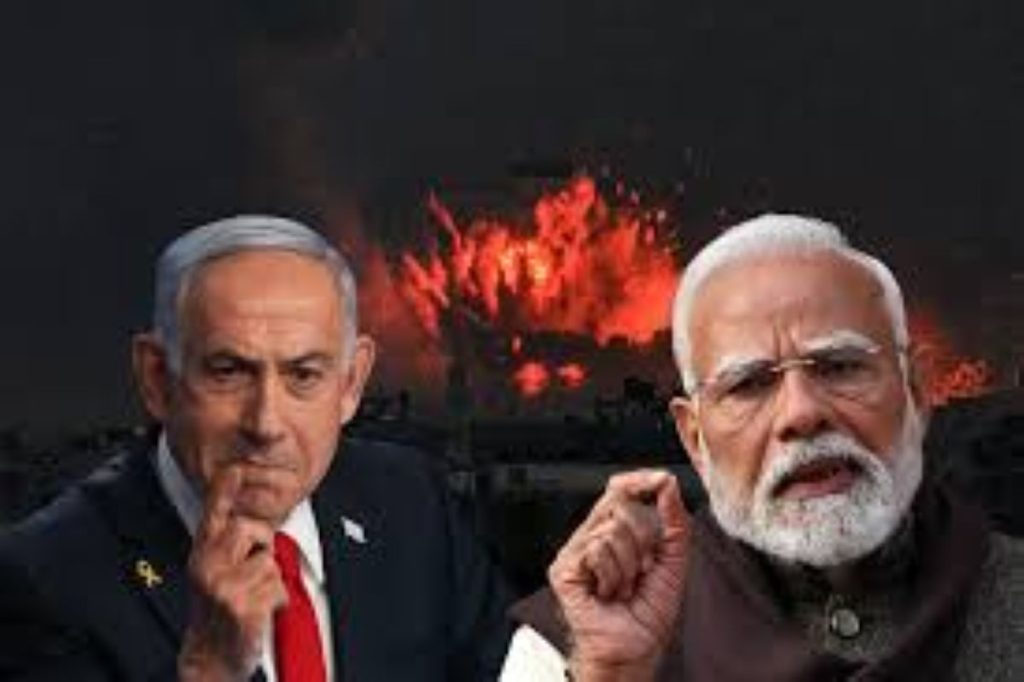In a crucial diplomatic exchange, Indian Prime Minister Narendra Modi held a phone call with Israeli Prime Minister Benjamin Netanyahu following a dramatic escalation in the Israel-Iran conflict. The conversation comes just hours after Israel launched a series of airstrikes on Iran in what is being described as the most serious military operation in the region in recent years.
Modi conveyed India’s “deep concern” over the rapidly deteriorating security situation and emphasized the urgent need for peace and stability in the Middle East.
Benjamin Netanyahu Briefs Modi on Regional Developments
According to a statement from the Prime Minister’s Office (PMO), Benjamin Netanyahu briefed Modi on the sequence of events that led to Operation Rising Lion, a large-scale Israeli military response targeting Iranian nuclear and military infrastructure.
Prime Minister Modi shared India’s deep concerns over regional instability and called for maximum restraint from all parties,” the MEA said.
The conversation underscores India’s balanced foreign policy, given its strategic ties with both Israel-Iran conflict.
Source: DNA INDIA NEWS
Israeli Prime Minister Benjamin Netanyahu’s Speech about Israel-Iran conflict
Netanyahu thanks PM Modi first among global leaders
Israeli PM says he spoke with “friends” India’s PM Modi, UK’s Starmer, France’s Macron & Germany’s Merz
Says all recognised Israel’s right to self-defence…Mentions Putin only in passing
PM Modi gets top billing in… pic.twitter.com/HWnvSL5rTt
— Nabila Jamal (@nabilajamal_) June 13, 2025
Source: (@nabilajamal_)
🇮🇳 India’s Response: A Call for Restraint and Peace
India’s Ministry of External Affairs (MEA) issued a parallel statement expressing “grave concern” over the ongoing hostilities. It urged all stakeholders to exercise restraint and resolve differences through diplomatic means.
India, which imports a significant portion of its crude oil from the Middle East, is particularly concerned about the economic and humanitarian fallout of a prolonged conflict.
What Is Operation Rising Lion?
On June 11, 2025, Israel launched Operation Rising Lion, a coordinated strike targeting over 100 Iranian assets, including suspected nuclear facilities, missile bases, and IRGC (Islamic Revolutionary Guard Corps) command centers. Explosions were reported in Tehran, Isfahan, and near the Fordow nuclear site.
Israeli Defence Forces claimed the operation was a response to a drone attack from Iranian proxies that struck an Israeli airbase earlier this week.
India’s Strategic Dilemma: Walking a Diplomatic Tightrope
India’s diplomatic stance is delicate. It maintains robust defense and trade relations with Israel, including cooperation in missile systems, agriculture, and cybersecurity. At the same time, Iran remains a key regional partner, particularly in energy and strategic connectivity via the Chabahar Port.
India’s main concerns in this conflict are:
- Safety of Indian nationals: Approximately 4,000 Indians reside in Iran and 32,000 in Israel.
- Energy security: Oil prices have already spiked by nearly 15% following the strikes.
- Geopolitical instability: The threat of a wider regional war could affect India’s outreach in West Asia.
Impact on Indian Nationals Abroad
Following the airstrikes, the Indian government issued travel advisories for Indian citizens living in both countries. Emergency helplines have been activated by Indian embassies in Tel Aviv and Tehran.
A senior MEA official told reporters,
“We’re monitoring the situation hourly. We urge all Indian nationals to register with the embassies and avoid non-essential travel.”
The government has also held high-level reviews on potential evacuation protocols if the conflict intensifies further.
Oil Prices Surge, Global Markets React
The attack led to an immediate reaction in global financial markets. Brent crude oil prices surged to $92 per barrel, the highest since October 2024. Experts warn that further escalation could significantly impact India’s import bill and contribute to inflation.
India, being the third-largest oil importer globally, faces the economic brunt of any Middle East crisis.
What This Means for India’s Foreign Policy
India’s swift and neutral diplomatic messaging reflects its intent to retain strategic autonomy in a polarized world. Modi’s outreach to Netanyahu signals that while India supports Israel’s security, it also respects Iran’s sovereignty and regional influence.
Former diplomat Rakesh Sood noted:
“India has to balance its Act East policy with Look West diplomacy. Any misstep could cost us dearly.”
International Reactions Pour In Israel-Iran conflict.
World powers including the United States, Russia, France, and Germany have issued statements urging de-escalation. The UN Security Council is expected to convene an emergency session.
President Biden stated that the U.S. “stands by Israel’s right to defend itself,” while also urging all sides to avoid targeting civilian infrastructure.
Stay Updated: PM Modi’s Diplomatic Call with Netanyahu Amid Israel-Iran Crisis on Prime Feeds
Conclusion:
The Modi-Netanyahu phone call is a powerful diplomatic gesture during a crisis that threatens global peace and regional stability. India, while deeply invested in both Israel-Iran, is working to ensure the safety of its citizens, the continuity of energy supplies, and the prevention of further escalation.
As developments unfold, India’s role as a global peacemaker will be closely watched—by its own citizens, its regional allies, and the international community.
